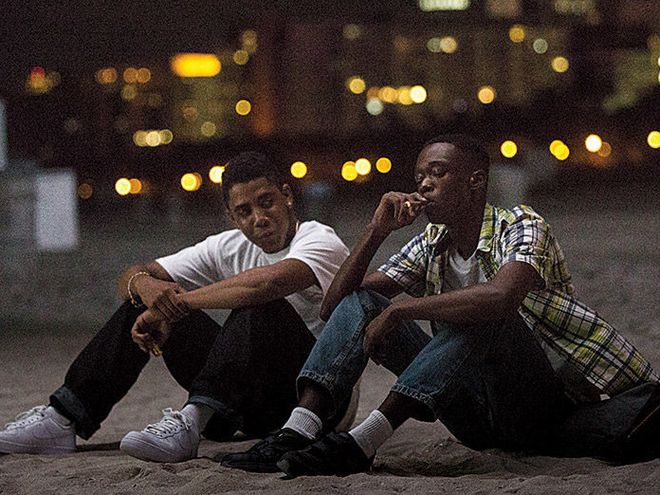Wednesday
Julia and I recently saw the Oscar-winning Moonlight and agreed with all the praise that film has received. At one point during the film, I thought I saw the influence of Imamu Baraka’s powerful play, The Toilet (1963).
The film gives us Chiron’s life in three acts: childhood, adolescence, and emerging adulthood. During his adolescence, he has a homosexual encounter on the beach with his closest friend Kevin, but the tenderness of that moment is shattered when Kevin, to prove to the school’s bully that he is no “faggot,” beats Chiron up. Rather than “stay down,” Chiron keeps getting up to take more hits, thereby denying Kevin an easy exit.
It is a pivotal moment in Chiron’s life. He decides to become tough and, after taking out bully with a desk and getting arrested, lifts weights in juvenile detention and goes on to become a drug dealer named “Black.” In the third act, he receives a repentant call from Kevin and begins to reconnect with his childhood sensitivity. He reveals that he hasn’t touched anyone since their moment together.
The entire story of the one-act Toilet is a similar fight scene, so much so that it almost works as a back story for Moonlight. Karolis has written a love note to Ray Foots, a smart boy for whom the teachers have high hopes but who is a member of a gang. Foots is set up to fight Karolis to prove that he is no “cocksucka.” He thinks he has escaped when he sees Karolis lying on the floor after the other gang members have dragged him to the bathroom.
Like Chiron, however, Karolis refuses to “stay down” and forces Foots to fight him. As he does so, he makes a distinction between “Ray” and “Foots,” the private face and the public. In the closet and out:
I’ll fight you, Foots! (Spits the name.) I’ll fight you. Right here in this same place where you said your name was Ray. (Screaming. He lunges at Foots and manages to grab him in a choke hold.) Ray, you said your name was. You said Ray. Right here in this filthy toilet. You said Ray. (He is choking Foots and screaming. Foots struggles and is punching Karolis in the back and stomach, but he cannot get out of the hold.) You put your hand on me and said Ray!
The other gang members come to Foots’s rescue and stomp Karolis. All leave but there is one final wordless scene:
After a minute or so Karolis moves his hand. Then his head moves and he tries to look up. He draws his legs up under him and pushes his head off the floor. Finally he manages to get to his hands and knees. He crawls over to one of the commodes, pulls himself up, then falls backward awkwardly and heavily. At this point, the door is pushed open slightly, then it opens completely and Foots comes in. He stares at Karolis’s body for a second, looks quickly over his shoulder, then runs and kneels before the body, weeping and cradling the head in his arms.
The tenderness is all the more powerful because of the sordid surroundings.
The play and film have pretty much the same message: in a difficult world, young black men deny and bury their sensitivity. A Chiron struggles within within Black and a Ray resides within Foots. When art articulates their condition, space is opened for hope.
